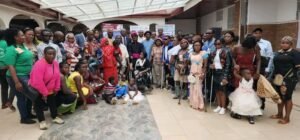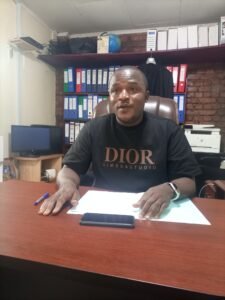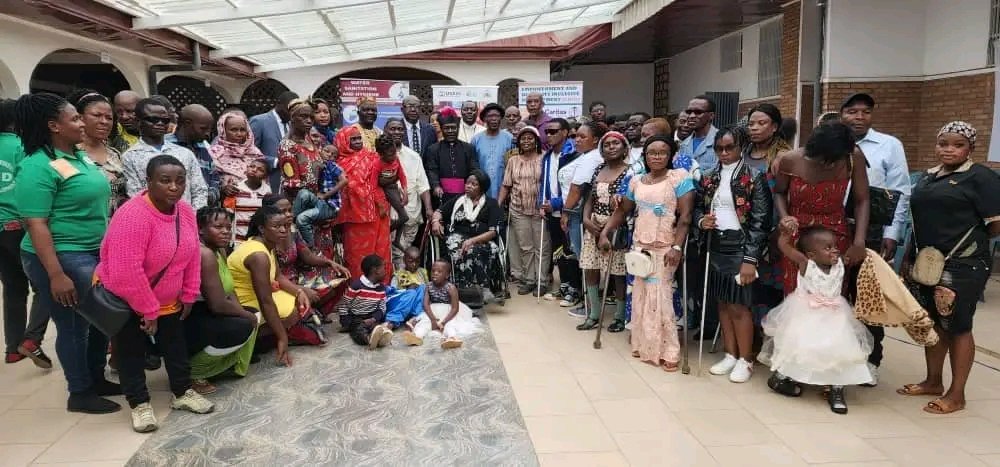By Hannah Bissong, Cameroon
….
Living in Bamenda, the capital of Cameroon’s conflict-ravaged Northwest region, is a serious challenge for 23-year-old Suzan, a blind woman. She uses a pseudonym to protect her identity due to fears of victimization as she expresses her frustration with the church, which she believes should protect her amidst the ongoing armed conflict. Continuous hostilities have left disabled people in pain. Suzan would have loved to pursue her education and future goals, but rising insecurity forced her out of school.
The armed conflict in Cameroon’s Anglophone Northwest and Southwest regions severely impedes access to basic services, prompting persons with disabilities to turn to the church for refuge, fearing worsening conditions. As faith and hope dwindle, they have begun voicing their frustration over their treatment by the church. Disabled people are dying from starvation, stray bullets, and abandonment as the bloody Anglophone conflict persists. They are among the most affected, as breadwinners quickly become bread beggars. Although countless rights groups, including Human Rights Watch has called for urgent inclusive humanitarian support in multiple reports, thousands of people with varying impairments are tired of waiting as access to food, shelter, healthcare, education, and economic opportunities remains challenging. Humanitarian schemes have largely been non-inclusive, leaving the disability community heavily dependent on alms for survival. Amidst despair and abandonment, the Roman Catholic, Baptist, and Presbyterian missions struggle to fill the gap and rekindle hope.
Due to the conflict, Suzan cannot build the future she dreams of. Schools have been disrupted in the Anglophone regions, putting her dreams on hold. “The conflict gave me reasons not to attend school because financing my education was difficult for my parents, and my opportunity was disappearing so fast. I really wanted to be educated like my siblings, but the insecurity was reason enough to withdraw me from school,” she told DNA in an interview in Bamenda.
Besides being a victim of the eight-year conflict, Suzan feels exploited by the Catholic Church, on which she now depends to gather her dreams. In an interview with DNA, she accused CARITAS Bamenda, the humanitarian arm of the Catholic Church, of exploiting her vulnerability and that of other persons with disabilities for financial gain. She believes the church uses them to raise funds that hardly benefit them. Suzan recounts a painful experience in 2021 when CARITAS invited dozens of disabled youths to an event in Bamenda. After being presented to cameras as beneficiaries of a church-run program, they were left stranded without transport money to return home.

“They would call us to participate in activities like singing, debates, and academic discourses, but as soon as the session ended, they abandoned us. We only smelled the delicacies because they never gave us food or cared to pay our transport fare,” she lamented with teary eyes.
“They promised complete house rents and school fees, but after collecting our personal details, they said, ‘we cannot fulfill it completely,'” Suzan added.
Suzan feels these are just some ways CARITAS exploits persons with disabilities in Bamenda.
Despite the accusations, she remains firm that the church is their lender of last resort. The conflict has forced many, whose futures depended on formal education, to stay home, returning to school only with the church’s help. That is why she won’t reveal her identity, to keep benefiting from what little the church offers.
CARITAS management denies exploiting disabled persons, stressing funding is a challenge. According to Rev. Father Frankline Kamgeh, Director of CARITAS, funds for projects sometimes do not cover transportation.
“We try to entertain guests due to limited funding from our partners,” he says.
When programs run and persons with disabilities don’t fully participate or understand the process and budget lines, situations of exploitation can arise. However, the director says they’ve always worked to prevent such from occuring. The prelate strongly refutes claims of using disabled people to generate income for the church. “Maybe that happens elsewhere but not in our organization,” Rev. Father Franklin said. The church has been committed to empowering the disability community even before the ongoing armed conflict. The director mentioned that CARITAS runs a Disability Inclusive Project, with the principal beneficiaries being persons with disabilities.

While many disabled people continue to claim they are used to generate income for church projects, Reverend Kamgeh insists the church invests significantly to accelerate inclusion. The Caritas boss disclosed that the Israel-Gaza conflict has drastically reduced their sources of funding, making it difficult to adequately support disabled persons affected by the Anglophone conflict. Despite the director of CARITAS’s statements, some disability inclusion experts feel empowering disabled people is meaningless without their involvement in project conception, implementation, and evaluation. A visually impaired advocate with almost 30 years of experience working with the Baptist and Roman Catholic missions in Bamenda expressed that disabled persons are not part of the church’s mainstreaming agenda. He believes the church is far from transforming inclusion paper talks into concrete reality.
In the Southwest region, largely dominated by the Presbyterian mission, concerns over the Presbyterian Community Rehabilitation Service’s approach to disability inclusion have led to allegations of exploitation for financial gain. A renowned leader of persons with disabilities in Buea, the capital of the southwest, claims the organization uses disabled people for income generation. “They regularly gather disabled people for photos in the name of empowerment but never use experienced facilitators with disabilities. We come as participants but end up as volunteer facilitators without compensation,” he reveals.
The leader states that the organization had no mandate to assist persons with disabilities, leaving thousands suffering while being repeatedly used. DNA reached out to the Presbyterian Community Rehabilitation Service leadership for a comment on the allegations, but no response has been received.
At a time when persons with disabilities are taking the stage to lead their own affairs, there is a strong feeling that Disabled People Organizations should champion projects about them. The Bamenda-based disability inclusion specialist says the church has a long way to go before becoming an ally of inclusion. He advises revisiting the foundation to make church infrastructure and content intentionally disability-friendly; otherwise, inclusion will remain an illusion. “They divide us to make money, and I am a victim,” he reveals, his voice thick with anger. He encourages youth with disabilities to unite and take their destinies into their hands, avoiding the church’s divisiveness, which many did not escape early.
Living with vision impairment even before the conflict, Suzan confirmed, was never easy amidst stigma and exclusion. Like most of her disabled peers, she was seen as a witch, a financial drainer, and a family disgrace. Although difficult, she finally gained access to formal education after staying home for almost eight years. Suzan says the conflict’s upsurge completely destroyed a promising future despite overcoming physical and attitudinal barriers. She was in junior secondary school when her dreams were cut short by the conflict.
Speaking to DNA anonymously, the inclusion specialist says he doesn’t expect anything better than the current status quo. He believes the absence of passion cannot be the basis for quality service. “It is because someone somewhere has financial resources and trusts the church to assist persons with disabilities, but the very foundation is void of passion and commitment,” he says.
“Church policies do not include persons with disabilities from the start, and struggling to give what they don’t have is only kicking a dead horse,” he says, highlighting the inaccessible infrastructure and non-inclusive health and educational programs of the church.
This story is sponsored by the US Embassy in Yaoundé, through the Cameroon Association of English Speaking Journalists (CAMASEJ)
….
Edited by Princely Kesah
